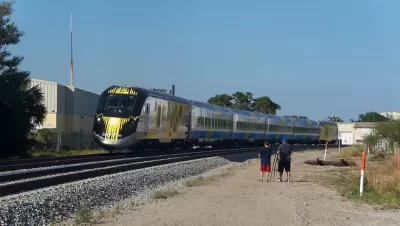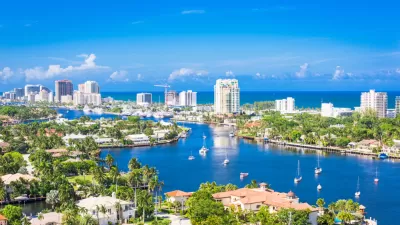The privately funded, diesel-powered trains will run at speeds up to 79 mph between West Palm Beach and Fort Lauderdale, with an extension to Miami opening early next year. Real estate development is key to profitability.

"The ambitious $3 billion Brightline express project will run along the state's densest population corridor with more than 6 million residents and a regular influx of tourists," reports Samantha Raphelson for WBUR News on Dec 7. According to the WBUR map [jpg], the trip from West Palm Beach to Fort Lauderdale will take 30 minutes and another 30 minutes to Miami when service begins.
The project, funded by All Aboard Florida, represents the first test into the long-awaited U.S. move into high-speed rail, says John Renne, director of the Center for Urban and Environmental Solutions at Florida Atlantic University.
Brightline is 'higher-speed rail,' not high-speed rail, which would require electrification (includes maglev rail) and grade separations at speeds above 125 mph, according to the Federal Railroad Administration. An extension to Orlando will enable speeds up to 125 mph. The trains will be powered by EPA Tier 4 compliant locomotives manufactured in Siemens' Sacramento, Calif. plant, which will also built the passenger cars.
"It's the first time that it's happening, being built by a private company," [Renne] tells Here & Now's Jeremy Hobson. "And that's kind of a game changer for this type of model."
“On a national level, the scale of impact could be enormous. It’s a proof of concept for private financing corridor-based infrastructure,” says Adie Tomer, a fellow at the Brookings Institution Metropolitan Policy Program, in a piece by Chris Persaud in Next City on Oct 23, 2017.
Profits to come from real estate, not train tickets
Beyond slashing travel times, Renne says the construction of private mixed-use real estate developments at each station will bring in hundreds of millions of dollars in new revenue. He explains that potential revenue was lost when the government shifted control of transportation to the public sector in the 1920s [or 30s].
When that happened, we lost the connection between the development around the stations and the rail service itself, and we started building a lot of parking lots around the stations," he says. [Renne expands on the relationship between real estate development and train profitability in the audio version].
"The research shows that the transportation service itself rarely makes a profit," he says. "But when you combine the real estate and development opportunities with the transportation service, you can ... actually get to a very profitable outcome."
Unlike the nation's two high-speed rail projects in Texas and California, Brightline will operate in a corridor already owned by All Aboard Florida's parent company, Florida East Coast Industries. "The return to passenger trains will revive a line that stopped running on those old tracks in the 1960s, with the arrival of the federal highway program," writes Raphelson.
Opposition
Like it's semi-counterpart in California, the rail line has sparked litigation by jurisdictions in the corridor. "Two counties along the wealthy Treasure Coast sued to stop the Brightline project, arguing it poses significant safety concerns and would likely delay commuters in cars," adds Raphelson. "Most of those lawsuits have been tossed out or dropped."
The boating industry has also raised objections due to the requirement that drawbridges remain down for trains to use them.
Fares
A 2015 study commissioned by the company suggests it will cost at least $16 to travel from West Palm to Miami – about $10 more than the price to travel a similar route on South Florida's government-run passenger train.
Renne is also extensively quoted in the October Next City piece that goes into much greater depth on the political opposition, and support, along the Treasure Coast.
FULL STORY: Florida Set To Launch Country's First Private High-Speed Train Service

Alabama: Trump Terminates Settlements for Black Communities Harmed By Raw Sewage
Trump deemed the landmark civil rights agreement “illegal DEI and environmental justice policy.”

Study: Maui’s Plan to Convert Vacation Rentals to Long-Term Housing Could Cause Nearly $1 Billion Economic Loss
The plan would reduce visitor accommodation by 25% resulting in 1,900 jobs lost.

Planetizen Federal Action Tracker
A weekly monitor of how Trump’s orders and actions are impacting planners and planning in America.

Wind Energy on the Rise Despite Federal Policy Reversal
The Trump administration is revoking federal support for renewable energy, but demand for new projects continues unabated.

Passengers Flock to Caltrain After Electrification
The new electric trains are running faster and more reliably, leading to strong ridership growth on the Bay Area rail system.

Texas Churches Rally Behind ‘Yes in God’s Back Yard’ Legislation
Religious leaders want the state to reduce zoning regulations to streamline leasing church-owned land to housing developers.
Urban Design for Planners 1: Software Tools
This six-course series explores essential urban design concepts using open source software and equips planners with the tools they need to participate fully in the urban design process.
Planning for Universal Design
Learn the tools for implementing Universal Design in planning regulations.
Caltrans
Smith Gee Studio
Institute for Housing and Urban Development Studies (IHS)
City of Grandview
Harvard GSD Executive Education
Toledo-Lucas County Plan Commissions
Salt Lake City
NYU Wagner Graduate School of Public Service




























